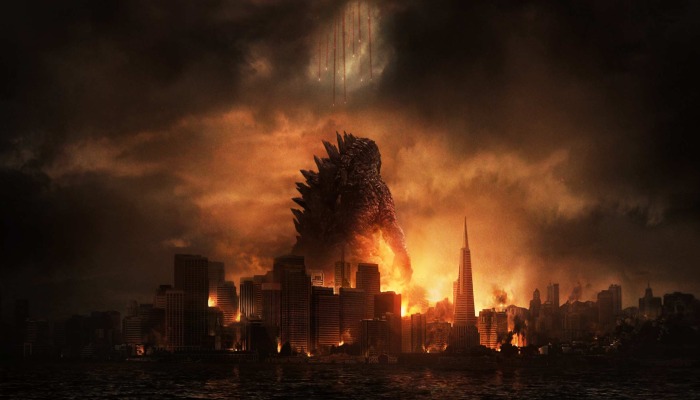 (3.5 / 5)
(3.5 / 5)
How many films is it possible to make about a giant rampaging lizard?
An idea may be all in the execution – after all, how many films can you make about a Walther-packing, martini-swilling super-spy? – but the need to have buildings crumble and people scream surely serves as something of a limiting factor.
Just as the latest Bond film, Skyfall, sought to honor the history of the franchise, so Gareth Edwards’ Godzilla sets out to breathe fiery new life into the beloved Toho series. Unlike Roland Emmerich’s raptor-like GINO (Godzilla In Name Only), Gareth’s monster – singular – is a chunky, chitinous Goliath 100 meters tall. Edwards’ approach to his subject is respectful, almost reverent, which makes his decision to background the colossal creature all the more curious.
Cribbing from Spielberg’s playbook on Jaws, the titular lizard barely appears till the final forty minutes: a cleverly redacted title sequence contains grainy footage of his spiky form gliding beneath the ocean or bestriding a nuclear blast, and there’s a glimpse of the beast from between the closing doors of a bunker, but, for the most part, Edwards is content to have the creature lie low in his own feature. When Godzilla does finally does appear in full, though, it is truly awe-inspiring.
The film opens in Janjira, Japan, where Bran Cranston’s family man- nuclear engineer Joe is shortly to undergo a tragedy, one that will estrange him from his son, Ford (Aaron Taylor Johnson), and transform him into an angry, frustrated conspiracy theorist. Fifteen years later, and shortly returned from duty, Johnson’s Ford is forced to leave his wife, Elle (Elizabeth Olsen in a thankless role) and travel out to Japan to bail out his dad.
Soon enough, though, the monsters rise, and Ford is torn between saving the day and getting home to his family in San Francisco. It’s fascinating that Edwards’ film mostly uses these rampaging monsters as background to/cause of human interaction. The focus here is on how mankind –Ken Watanabe’s conscientious Japanese scientist, David Strathairn’s taciturn military man – respond to such wholesale destruction. Despite the scope and scale of the destruction, Godzilla never forgets to take an interest at what’s going on at ground level.
The empathetic, level-headed Ford is mostly a medium for conveying the film’s set pieces – the father-son dynamic Godzilla builds up between him and Joe, their mutual disappointment in the other, is quickly dispensed with in favor of mantis-like monsters and nuclear weapons. It even manages to work in an El-train attack, so beloved of kaiju movies, among a host of other, subtler references. There aren’t many laughs here: the tone of Evans’ film is closer to Emmerich’s The Day After Tomorrow than his Godzilla.
The film portrays humanity’s presence on the planet as self-assured yet fleeting; our deaths in the face of these warring gods is utterly incidental. Though the film may force a few contrived face-to-face-with-the-monster moments, Godzilla itself remains an amoral force: his role as mankind’s protector is inadvertent; the other monsters are the only things large enough to occupy his attention.
From a tense night-time attack on a mist-shrouded bridge to a thrillingly immersive HALO jump, Godzilla finds a way to balance the micro – the experiences of one man – with the macro – the people whose lives are torn apart. In fact, the climactic monster rumble feels almost like an after-thought; as such, those who come solely for the smashy-smashy may well leave disappointed.
The second act is overlong, a handful of obvious clichés – the gigantic beings show the ability to make entrances and exits with surprising stealth when the plot demands it – and Brody is a fairly generic POV protagonist, but its Edwards’ approach to the material that makes Godzilla something special. There’s a lingering grandeur that befits the film’s goliath subjects; this is a monster movie, as it should be done, a work of cinema that Spielberg himself could take pride in.
Who’d have thought that nuclear angst still has some mileage left in it, or that Pacific Rim could have been better without the robots?
